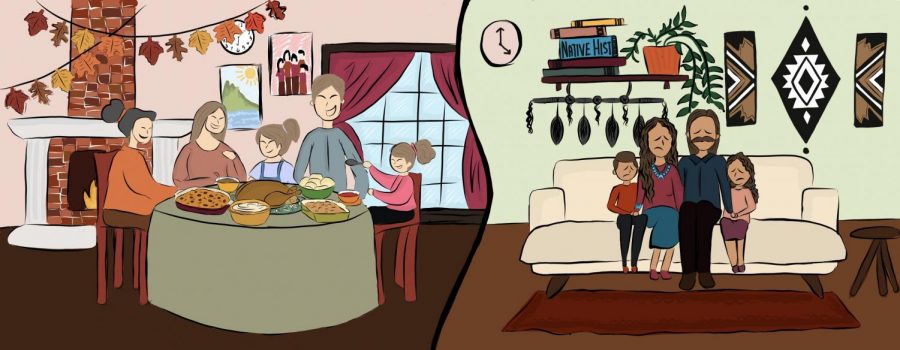Americans need to recognize Thanksgiving’s problematic history
November 20, 2020
Thanksgiving is a beloved holiday for many Americans. Families gathered around the dinner table, giving thanks and eating pumpkin pie is a staple of autumnal tradition. However, amid turkey-eating and football-watching, we often forget the troubling origins of this holiday. We hail Thanksgiving as a model of unity and gratitude, but how can we celebrate these compassionate ideals while standing on stolen land?
Like many other children, I remember learning the tale of the first Thanksgiving. I was in elementary school; my class created stereotypical headdresses out of colored paper and believed every half-truth we were told about “the Pilgrims and the Indians.”
I’m sure you know the story very well by now—how the Pilgrims landed on Plymouth Rock and sought help from the Wampanoag tribe, who eventually taught them how to harvest food and live off of their land. As a thank you, the Pilgrims invited the tribe to a grand feast that we now call Thanksgiving.
However, this oversimplified story is contested amongst historians. David Silverman, history professor and author of the book This Land Is Their Land: The Wampanoag Indians, Plymouth Colony, and the Troubled History of Thanksgiving, explains that by emphasizing one moment of unity, we erase an entire history of mistreatment towards Indigenous people.
In a 2019 interview with Smithsonian Magazine, Silverman says that the Wampanoag suffered a century of violent contact with Europeans before the Pilgrims arrived in 1620, causing many to die of European diseases. The idea that the Pilgrims were the first to collide with Native Americans erases a dark history of blood-shed.
Additionally, Ramona Peters, the Mashpee Wampanoag Tribe’s Tribal Historic Preservation Officer, states that her ancestors were not even formally invited to a meal with the Pilgrims. Peters told the digital news platform Indian Country Today that the image of Pilgrims and Native Americans happily eating together was concocted by Abraham Lincoln in an attempt to unify the American people during the Civil War.
It is clear that Thanksgiving was not created to honor Native Americans, but to glorify colonialism and erase centuries of mistreatment towards Indigenous people.
So while we should understand the origins of this holiday, it is more important to recognize the treatment of Native Americans today.
In 2017, President Donald Trump ignored the protests of the Standing Rock Sioux Tribe and signed an order to create the Dakota Access Pipeline, according to CNBC. This project would have ripped through sacred Native land, and it could have potentially damaged the tribe’s drinking water. After several years of protesting, a federal judge finally blocked this initiative last July.
Additionally, the Center for Disease Control and Prevention (CDC) said that Indigenous communities have suffered disproportionately from the coronavirus. As of April 30, The Harvard Gazette reported that the Navajo nation had the third-highest per capita rate of Covid-19 in the United States.
Most importantly, we have all taken enough history courses to know that our ancestors did not treat Indigenous people with the same love and respect we preach every Thanksgiving. This holiday so blatantly undermines the attacks our country continues to make against Indigenous people, focusing on one moment of unity instead of centuries of systemic oppression.
I am not saying that we should abandon the holiday altogether—the idea of giving for the sake of giving is still beautiful in theory, but it is clearly time for us to rethink the way we celebrate this holiday.
This Thanksgiving, let’s educate ourselves about Native American history, donate to Indigenous communities suffering from Covid-19 and support Native-owned businesses and artists. If you choose to observe Thanksgiving, celebrate respectfully and don’t forget its deeply problematic history.



